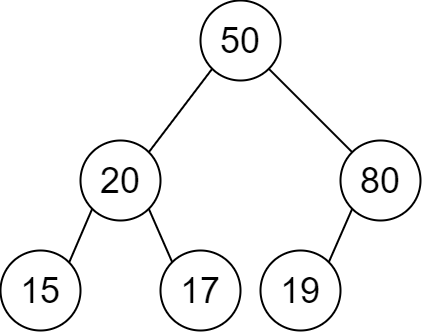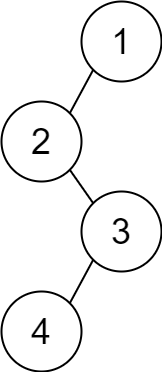| comments | difficulty | edit_url | rating | source | tags | ||||
|---|---|---|---|---|---|---|---|---|---|
true |
Medium |
1643 |
Weekly Contest 283 Q3 |
|
You are given a 2D integer array descriptions where descriptions[i] = [parenti, childi, isLefti] indicates that parenti is the parent of childi in a binary tree of unique values. Furthermore,
- If
isLefti == 1, thenchildiis the left child ofparenti. - If
isLefti == 0, thenchildiis the right child ofparenti.
Construct the binary tree described by descriptions and return its root.
The test cases will be generated such that the binary tree is valid.
Example 1:
Input: descriptions = [[20,15,1],[20,17,0],[50,20,1],[50,80,0],[80,19,1]] Output: [50,20,80,15,17,19] Explanation: The root node is the node with value 50 since it has no parent. The resulting binary tree is shown in the diagram.
Example 2:
Input: descriptions = [[1,2,1],[2,3,0],[3,4,1]] Output: [1,2,null,null,3,4] Explanation: The root node is the node with value 1 since it has no parent. The resulting binary tree is shown in the diagram.
Constraints:
1 <= descriptions.length <= 104descriptions[i].length == 31 <= parenti, childi <= 1050 <= isLefti <= 1- The binary tree described by
descriptionsis valid.
We can use a hash table
We iterate through the
If
Finally, we iterate through
The time complexity is
# Definition for a binary tree node.
# class TreeNode:
# def __init__(self, val=0, left=None, right=None):
# self.val = val
# self.left = left
# self.right = right
class Solution:
def createBinaryTree(self, descriptions: List[List[int]]) -> Optional[TreeNode]:
nodes = defaultdict(TreeNode)
children = set()
for parent, child, isLeft in descriptions:
if parent not in nodes:
nodes[parent] = TreeNode(parent)
if child not in nodes:
nodes[child] = TreeNode(child)
children.add(child)
if isLeft:
nodes[parent].left = nodes[child]
else:
nodes[parent].right = nodes[child]
root = (set(nodes.keys()) - children).pop()
return nodes[root]/**
* Definition for a binary tree node.
* public class TreeNode {
* int val;
* TreeNode left;
* TreeNode right;
* TreeNode() {}
* TreeNode(int val) { this.val = val; }
* TreeNode(int val, TreeNode left, TreeNode right) {
* this.val = val;
* this.left = left;
* this.right = right;
* }
* }
*/
class Solution {
public TreeNode createBinaryTree(int[][] descriptions) {
Map<Integer, TreeNode> nodes = new HashMap<>();
Set<Integer> children = new HashSet<>();
for (var d : descriptions) {
int parent = d[0], child = d[1], isLeft = d[2];
if (!nodes.containsKey(parent)) {
nodes.put(parent, new TreeNode(parent));
}
if (!nodes.containsKey(child)) {
nodes.put(child, new TreeNode(child));
}
if (isLeft == 1) {
nodes.get(parent).left = nodes.get(child);
} else {
nodes.get(parent).right = nodes.get(child);
}
children.add(child);
}
for (var e : nodes.entrySet()) {
if (!children.contains(e.getKey())) {
return e.getValue();
}
}
return null;
}
}/**
* Definition for a binary tree node.
* struct TreeNode {
* int val;
* TreeNode *left;
* TreeNode *right;
* TreeNode() : val(0), left(nullptr), right(nullptr) {}
* TreeNode(int x) : val(x), left(nullptr), right(nullptr) {}
* TreeNode(int x, TreeNode *left, TreeNode *right) : val(x), left(left), right(right) {}
* };
*/
class Solution {
public:
TreeNode* createBinaryTree(vector<vector<int>>& descriptions) {
unordered_map<int, TreeNode*> nodes;
unordered_set<int> children;
for (const auto& d : descriptions) {
int parent = d[0], child = d[1], isLeft = d[2];
if (!nodes.contains(parent)) {
nodes[parent] = new TreeNode(parent);
}
if (!nodes.contains(child)) {
nodes[child] = new TreeNode(child);
}
if (isLeft) {
nodes[parent]->left = nodes[child];
} else {
nodes[parent]->right = nodes[child];
}
children.insert(child);
}
for (const auto& [k, v] : nodes) {
if (!children.contains(k)) {
return v;
}
}
return nullptr;
}
};/**
* Definition for a binary tree node.
* type TreeNode struct {
* Val int
* Left *TreeNode
* Right *TreeNode
* }
*/
func createBinaryTree(descriptions [][]int) *TreeNode {
nodes := map[int]*TreeNode{}
children := map[int]bool{}
for _, d := range descriptions {
parent, child, isLeft := d[0], d[1], d[2]
if _, ok := nodes[parent]; !ok {
nodes[parent] = &TreeNode{Val: parent}
}
if _, ok := nodes[child]; !ok {
nodes[child] = &TreeNode{Val: child}
}
if isLeft == 1 {
nodes[parent].Left = nodes[child]
} else {
nodes[parent].Right = nodes[child]
}
children[child] = true
}
for k, v := range nodes {
if _, ok := children[k]; !ok {
return v
}
}
return nil
}/**
* Definition for a binary tree node.
* class TreeNode {
* val: number
* left: TreeNode | null
* right: TreeNode | null
* constructor(val?: number, left?: TreeNode | null, right?: TreeNode | null) {
* this.val = (val===undefined ? 0 : val)
* this.left = (left===undefined ? null : left)
* this.right = (right===undefined ? null : right)
* }
* }
*/
function createBinaryTree(descriptions: number[][]): TreeNode | null {
const nodes: Record<number, TreeNode> = {};
const children = new Set<number>();
for (const [parent, child, isLeft] of descriptions) {
if (!nodes[parent]) {
nodes[parent] = new TreeNode(parent);
}
if (!nodes[child]) {
nodes[child] = new TreeNode(child);
}
if (isLeft) {
nodes[parent].left = nodes[child];
} else {
nodes[parent].right = nodes[child];
}
children.add(child);
}
for (const [k, v] of Object.entries(nodes)) {
if (!children.has(+k)) {
return v;
}
}
}// Definition for a binary tree node.
// #[derive(Debug, PartialEq, Eq)]
// pub struct TreeNode {
// pub val: i32,
// pub left: Option<Rc<RefCell<TreeNode>>>,
// pub right: Option<Rc<RefCell<TreeNode>>>,
// }
//
// impl TreeNode {
// #[inline]
// pub fn new(val: i32) -> Self {
// TreeNode {
// val,
// left: None,
// right: None
// }
// }
// }
use std::cell::RefCell;
use std::collections::{HashMap, HashSet};
use std::rc::Rc;
impl Solution {
pub fn create_binary_tree(descriptions: Vec<Vec<i32>>) -> Option<Rc<RefCell<TreeNode>>> {
let mut nodes = HashMap::new();
let mut children = HashSet::new();
for d in descriptions {
let parent = d[0];
let child = d[1];
let is_left = d[2];
nodes
.entry(parent)
.or_insert_with(|| Rc::new(RefCell::new(TreeNode::new(parent))));
nodes
.entry(child)
.or_insert_with(|| Rc::new(RefCell::new(TreeNode::new(child))));
if is_left == 1 {
nodes.get(&parent).unwrap().borrow_mut().left =
Some(Rc::clone(nodes.get(&child).unwrap()));
} else {
nodes.get(&parent).unwrap().borrow_mut().right =
Some(Rc::clone(nodes.get(&child).unwrap()));
}
children.insert(child);
}
for (key, node) in &nodes {
if !children.contains(key) {
return Some(Rc::clone(node));
}
}
None
}
}/**
* Definition for a binary tree node.
* function TreeNode(val, left, right) {
* this.val = (val===undefined ? 0 : val)
* this.left = (left===undefined ? null : left)
* this.right = (right===undefined ? null : right)
* }
*/
/**
* @param {number[][]} descriptions
* @return {TreeNode}
*/
var createBinaryTree = function (descriptions) {
const nodes = {};
const children = new Set();
for (const [parent, child, isLeft] of descriptions) {
if (!nodes[parent]) {
nodes[parent] = new TreeNode(parent);
}
if (!nodes[child]) {
nodes[child] = new TreeNode(child);
}
if (isLeft) {
nodes[parent].left = nodes[child];
} else {
nodes[parent].right = nodes[child];
}
children.add(child);
}
for (const [k, v] of Object.entries(nodes)) {
if (!children.has(+k)) {
return v;
}
}
};
